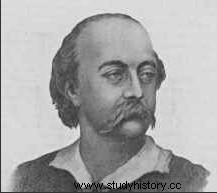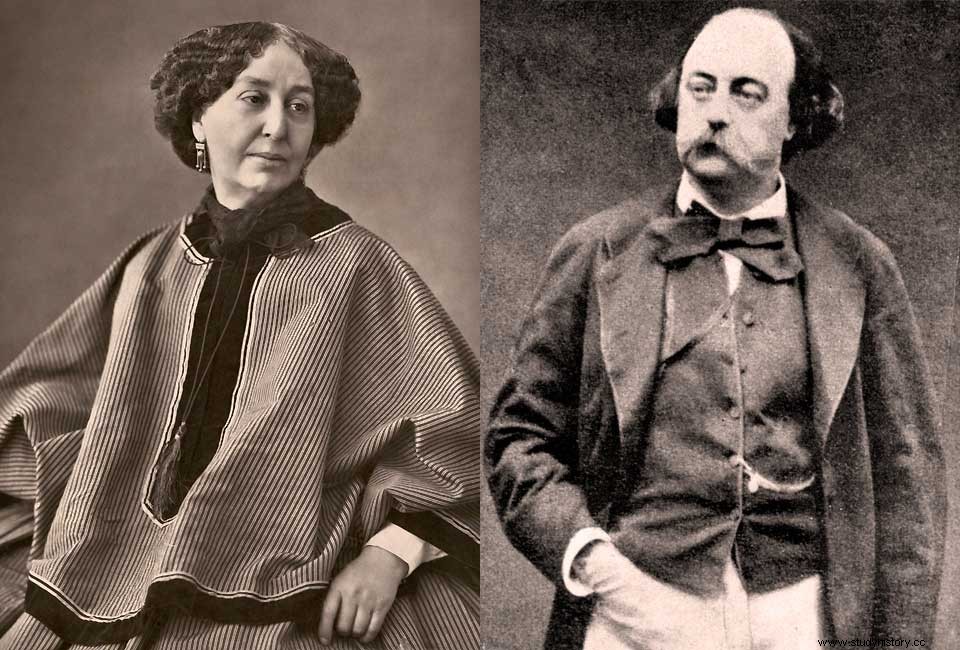 Gustave Flaubert (1821-1880) is a French writer , considered one of the masters of realist literature, in opposition to nineteenth-century romanticism. His work is essential by the scandal caused by the publication in 1857 of Madame Bovary (1857). In this realistic novel with multiple points of view, Flaubert denounces the conformism of the society of his time which, not supporting criticism, sues him from which he emerges acquitted. He is distinguished by his conception of the profession of writer (he leaves no room for chance and does very well-documented research) and by the modernity of his writing.
Gustave Flaubert (1821-1880) is a French writer , considered one of the masters of realist literature, in opposition to nineteenth-century romanticism. His work is essential by the scandal caused by the publication in 1857 of Madame Bovary (1857). In this realistic novel with multiple points of view, Flaubert denounces the conformism of the society of his time which, not supporting criticism, sues him from which he emerges acquitted. He is distinguished by his conception of the profession of writer (he leaves no room for chance and does very well-documented research) and by the modernity of his writing.
Short biography of Gustave Flaubert
Born in Rouen (Normandy), Gustave Flaubert began writing at an early age, convinced that this was his vocation. After studying law in Paris, which he interrupted because of severe epileptic seizures, he moved to Croisset, a small town near Rouen, and decided to devote himself entirely to his career as a writer.
Gustave Flaubert took five years to complete his first novel, Madame Bovary, whose publication in 1857 caused a scandal. Accused of immorality, he is finally acquitted by justice. The success of the work is assured.
 At Croisset, he received frequent visits from George Sand and learned the trade of writer from the young Guy de Maupassant . He continues to write, but at a slow and diligent pace. He notably published Salammbô (1862), a historical novel, Sentimental Education (1869), a largely autobiographical novel, and Bouvard et Pécuchet (posthumous, 1881), an unfinished work which describes human stupidity through the thirst for knowledge and preconceived ideas of two men, whom he describes as "woodlice". He died at the age of fifty-eight, exhausted, at his desk.
At Croisset, he received frequent visits from George Sand and learned the trade of writer from the young Guy de Maupassant . He continues to write, but at a slow and diligent pace. He notably published Salammbô (1862), a historical novel, Sentimental Education (1869), a largely autobiographical novel, and Bouvard et Pécuchet (posthumous, 1881), an unfinished work which describes human stupidity through the thirst for knowledge and preconceived ideas of two men, whom he describes as "woodlice". He died at the age of fifty-eight, exhausted, at his desk.
Flaubert's working method
For Gustave Flaubert, writing does not come from inspiration, but from work. Before writing a work, he gathers abundant documentation and carries out meticulous research. He constantly revises his texts, sometimes spending several days writing a sentence. Finally, he submits his writings to the test of the "bawler":he yells them to check that they ring true.
The quasi-scientific method with which Flaubert creates his stories and his constant search for perfection influenced all the realist literature of the end of the 19th century, and in particular the naturalist school .
Flaubert's main works
1839:Smarh (narrative)
1842:November (autobiographical writing)
1857:Madame Bovary (story)
1862:Salammbô (narrative)
1869:Sentimental Education (2nd version) (narrative)
1874:The Temptation of Saint Anthony (narrative)
1874:The Candidate (theatre)
1877:Three Tales (narrative) posth.
1881:Bouvard and Pécuchet (story) posth.
1900:Memoirs of a madman (narrative) posth.
1911:Dictionary of posth. received ideas.
1914:Sentimental Education (1st version) (narrative)
To go further
- Gustave Flaubert, a special way of living, biography, by Pierre-Marc de Biasi. Pocket, 2011.
- Flaubert, biography, by Bernard Fauconnier. Folio, 2012.
